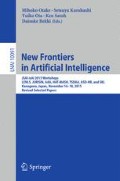Abstract
In legal debates, it is a matter of importance whether one’s own argument is accepted or not. For this, we propose evaluation method for calculating the acceptability of arguments, and a tool developed based on the measures. This method is called reliability-based argumentation framework (RAFs), extended from argumentation framework, seeking for multivalued dialectical validities of arguments reliable to some extent. The modular reliability-based argumentation framework (MRAF) based on RAFs is able to integrate the RAF semantics in every module. This leads to an over-all valuation of the acceptability of argumentations including several local arguments. The argumentation-support tool can represent the utterance logs of those who join an debate, the argumentation diagram its users made, and the argumentation framework converted from this, contributing to the intuitive comprehension of the logical structures of arguments and their acceptability. This tool also enables represented argumentation framework to be converted into modular structures of local AFs, leading to an overall valuation of the acceptability of arguments.
Access this chapter
Tax calculation will be finalised at checkout
Purchases are for personal use only
References
Reed, C., Rowe, G.: Araucaria: software for argument analysis, diagramming and representation. Int. J. Artif. Intell. Tools 13(04), 961–979 (2004)
Stephen, T.: The Uses of Argument. Cambridge University Press, Cambridge (1958)
Dung, P.M.: On the acceptability of arguments and its fundamental role in nonmonotonic reasoning, logic programming and n-person games. Artif. Intell. 77(2), 321–357 (1995)
Atkinson, K., Bench-Capon, T., Dunne, P.E.: Uniform argumentation frameworks. In: Computational Models of Argument: Proceedings of COMMA 2012, vol. 245, p. 165 (2012)
Dunne, P.E., Hunter, A., McBurney, P., Parsons, S., Wooldridge, M.: Weighted argument systems: basic definitions, algorithms, and complexity results. Artif. Intell. 175(2), 457–486 (2011)
Torre, L., Villata, S.: An aspic-based legal argumentation framework for deontic reasoning. In: Computational Models of Argument: Proceedings of COMMA 2014, pp. 266–421 (2014)
Muntjewerff, A.J., Breuker, J.A.: Evaluating PROSA, a system to train solving legal cases. In: Artificial Intelligence in Education: Ai-Ed in the Wired and Wireless Future, pp. 278–285 (2001)
Aleven, V.: An intelligent learning environment for case-based argumentation. Technol. Instr. Cognit. Learn. 4(2), 191–241 (2006)
Pinkwart, N., Aleven, V., Ashley, K., Lynch, C.: Evaluating legal argument instruction with graphical representations using LARGO. Front. Artif. Intell. Appl. 158, 101 (2007)
Pinkwart, N., Lynch, C., Ashley, K., Aleven, V.: Re-evaluating LARGO in the classroom: are diagrams better than text for teaching argumentation skills? In: Woolf, B.P., Aïmeur, E., Nkambou, R., Lajoie, S. (eds.) ITS 2008. LNCS, vol. 5091, pp. 90–100. Springer, Heidelberg (2008). doi:10.1007/978-3-540-69132-7_14
Ravenscroft, A., Pilkington, R.M.: Investigation by design: developing dialogue models to support reasoning and conceptual change. Int. J. Artif. Intell. Educ. 11(1), 273–298 (2000)
Dung, P.M., Thang, P.M., Hung, N.D.: Modular argumentation for modelling legal doctrines of performance relief. Argument Comput. 1(1), 47–69 (2010)
Brewka, G., Eiter, T.: Argumentation context systems: a framework for abstract group argumentation. In: Erdem, E., Lin, F., Schaub, T. (eds.) LPNMR 2009. LNCS (LNAI), vol. 5753, pp. 44–57. Springer, Heidelberg (2009). doi:10.1007/978-3-642-04238-6_7
Modgil, S.: Reasoning about preferences in argumentation frameworks. Artif. Intell. 173(9), 901–934 (2009)
Amgoud, L., Cayrol, C.: On the acceptability of arguments in preference-based argumentation. In: Proceedings of the Fourteenth conference on Uncertainty in Artificial Intelligence, pp. 1–7. Morgan Kaufmann Publishers Inc. (1998)
Bench-Capon, T.J.: Persuasion in practical argument using value-based argumentation frameworks. J. Logic Comput. 13(3), 429–448 (2003)
Tang, Y., Cai, K., McBurney, P., Sklar, E., Parsons, S.: Using argumentation to reason about trust and belief. J. Logic Comput., exr038 (2011)
Li, H., Oren, N., Norman, T.J.: Probabilistic argumentation frameworks. In: Modgil, S., Oren, N., Toni, F. (eds.) TAFA 2011. LNCS (LNAI), vol. 7132, pp. 1–16. Springer, Heidelberg (2012). doi:10.1007/978-3-642-29184-5_1
Pazienza, A., Esposito, F., Ferilli, S.: An authority degree-based evaluation strategy for abstract argumentation frameworks (2013)
Caminada, M.: On the issue of reinstatement in argumentation. In: Fisher, M., Hoek, W., Konev, B., Lisitsa, A. (eds.) JELIA 2006. LNCS (LNAI), vol. 4160, pp. 111–123. Springer, Heidelberg (2006). doi:10.1007/11853886_11
Katsura, Y., Okada, S., Nitta, K.: Dynamic argumentaion support tool using argument diagram. Ann. Conf. J. Soc. Artif. Intell. 29, 1–4 (2015). (in Japanese)
Prakken, H.: An overview of formal models of argumentation and their application in philosophy. Stud. Logic 4(1), 65–86 (2011)
Author information
Authors and Affiliations
Corresponding author
Editor information
Editors and Affiliations
Rights and permissions
Copyright information
© 2017 Springer International Publishing AG
About this paper
Cite this paper
Nishina, K., Katsura, Y., Okada, S., Nitta, K. (2017). Argumentation Support Tool with Reliability-Based Argumentation Framework. In: Otake, M., Kurahashi, S., Ota, Y., Satoh, K., Bekki, D. (eds) New Frontiers in Artificial Intelligence. JSAI-isAI 2015. Lecture Notes in Computer Science(), vol 10091. Springer, Cham. https://doi.org/10.1007/978-3-319-50953-2_19
Download citation
DOI: https://doi.org/10.1007/978-3-319-50953-2_19
Published:
Publisher Name: Springer, Cham
Print ISBN: 978-3-319-50952-5
Online ISBN: 978-3-319-50953-2
eBook Packages: Computer ScienceComputer Science (R0)

